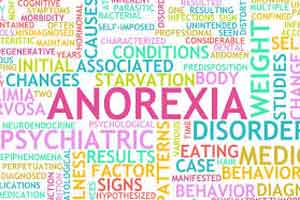- Home
- Editorial
- News
- Practice Guidelines
- Anesthesiology Guidelines
- Cancer Guidelines
- Cardiac Sciences Guidelines
- Critical Care Guidelines
- Dentistry Guidelines
- Dermatology Guidelines
- Diabetes and Endo Guidelines
- Diagnostics Guidelines
- ENT Guidelines
- Featured Practice Guidelines
- Gastroenterology Guidelines
- Geriatrics Guidelines
- Medicine Guidelines
- Nephrology Guidelines
- Neurosciences Guidelines
- Obs and Gynae Guidelines
- Ophthalmology Guidelines
- Orthopaedics Guidelines
- Paediatrics Guidelines
- Psychiatry Guidelines
- Pulmonology Guidelines
- Radiology Guidelines
- Surgery Guidelines
- Urology Guidelines
Genetic risk, stress, dieting may trigger anorexia: Study

New York : A combination of genetic and environmental risk factors may trigger the compulsive restriction of food intake seen in patients with anorexia, a new study in mice has found.
The findings may help to identify new prevention and treatment strategies for the eating disorder in humans, researchers from Columbia University in the US said.
Scientists have long suspected that a combination of genetic, biological, psychological, and sociocultural variables raise the risk of anorexia.
In the new study, researchers described a new mouse model featuring a combination of genetic and environmental risk factors that can trigger the compulsive restriction of food intake seen in patients with anorexia nervosa.
"We think that for the first time, we have a mouse model of anorexia that closely resembles the conditions leading up to the disease in humans," said Lori Zeltser from Columbia University.
"And this model not only shows us the most important factors that contribute to the onset of anorexia, it is also helping us to identify signalling pathways in the brain that ultimately drive this potentially fatal eating disorder," Zeltser said.
Anorexia has a mortality rate of 8 to 15 per cent, the highest of any psychiatric disease. There is no cure for it.
For the new mouse model, researchers exposed adolescent mice with at least one copy of a variant of the BDNF gene, which has been associated with anorexia and anxiety in mice and humans, to social stress and caloric restriction.
"One driver of anorexia in humans is peer pressure, specifically, the desire to be thin. People assumed that you could not replicate that in a mouse," said Zeltser.
"We decided to take peer pressure out of the equation and focus on social stress, which can be accomplished by housing mice alone, instead of in groups," she said.
The mice were then placed on a calorie-restricted diet, which usually precedes the development of anorexia in adolescent humans and may act as a trigger for eating disorders.

Disclaimer: This site is primarily intended for healthcare professionals. Any content/information on this website does not replace the advice of medical and/or health professionals and should not be construed as medical/diagnostic advice/endorsement or prescription. Use of this site is subject to our terms of use, privacy policy, advertisement policy. © 2020 Minerva Medical Treatment Pvt Ltd